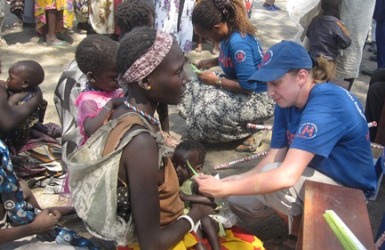UN: S. Sudan’s humanitarian situation “extremely” serious
By Julius N. Uma
January 2, 2012 (PIBOR) — The United Nations humanitarian coordinator
in Thursday described as “extremely” serious the situation of nearly
88,000 people displaced in the aftermath of ethnic violence in South
Sudan’s Pibor County, Jonglei state.

humanitarian situation on the ground, said her office, despite limited
resources, will continue drawing international attention to the
enormous challenges that have characterized Africa’s newest nation.
“The humanitarian situation is extremely serious,” said Amos, adding
that, “[And] currently the UN is extremely stretched to manage the
overwhelming situation in the region.”
A wave of ethnic clashes between the Murle and Luo Nuer communities in
Jonglei spiked in April, June August with the most recent in January
and December, forcing the South Sudan government do declare the state
a disaster zone.
An estimated over 120,000 people, according to the UN, have been
displaced as a result of the violence.
Amos, also the UN emergency relief coordinator said $760 million has
already been earmarked this year for South Sudan humanitarian needs,
but acknowledged the funds could be insufficient if the region
continues experiencing more violence.
Notable infrastructural challenges, she said, has greatly hampered
effective responses from aid agencies, but lauded the operational
coordination hub established in Pibor to respond to conflict affected
areas in and around the town.
A total of 17 humanitarian organizations are currently providing
live-saving assistance to the population in Pibor, yet only eight were
in operation in the region prior to the latest outbreak of violence.
Joshua Konyi, the Pibor county commissioner told the visiting UN team
that more organized forces needed to be deployed in the region to
avert further attacks.
“Our people are now for peace,” he said. “All we need is to engage the
youth in agricultural activities or other forms of income generating
activities so that they are not idle.”
Loud cries from malnourished children welcomed the UN humanitarian
coordinator as she entered Pibor Boys Primary school, temporarily
transformed into a health facility for hundreds of malnourished
children from surrounding areas of the county.
Statistic availed by health officials in the region indicate the
numbers of those malnourished is now eight times when compared to that
of last year for January alone, while that of Malaria is six times
that of the previous year.
Also over 9,000 children are reportedly out of schools in Pibor, which
has one secondary and 29 primary schools. Efforts are underway,
according to UN Children Fund (UNICEF) officials closely working with
county education officials, to mobilise children back to school.
QUICK FACTS ON PIBOR
• 88,396 people have been registered in needs of assistance
• 44,170 people have been provided with food
• 2,146 people treated with malaria in January
• 59 people have been medically evacuated to Juba and Bor.
